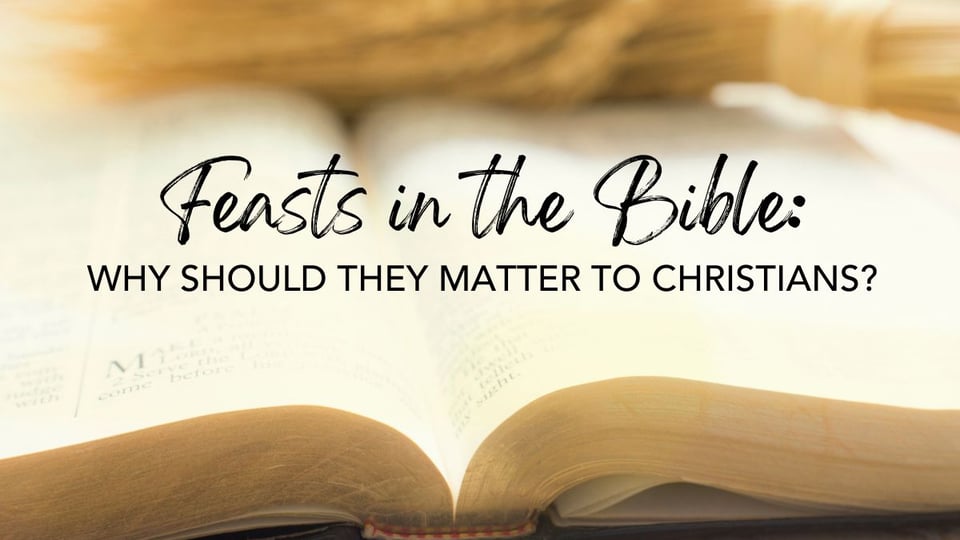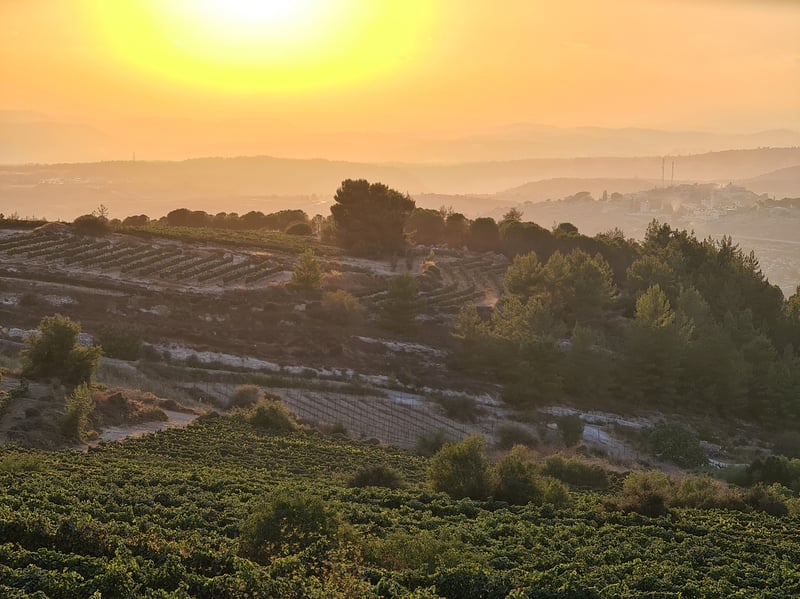Feasts in the Bible: Why Should They Matter to Christians?
Leviticus 23 records the “feasts of the Lord.” What are these feasts? Though often dismissed as “Jewish” holidays, are they also relevant to Christians?

What are the feasts in the Bible?
The Bible lists seven annual feast days: Passover, the Feast of Unleavened Bread, the Feast of Weeks, the Feast of Trumpets, the Day of Atonement, the Feast of Tabernacles and the Last Great Day. These feasts are outlined in Leviticus 23.
The word feasts in this passage means appointed times, specific observances God has designated as holy, or set apart. Their holiness comes from the tremendous spiritual significance God has attached to each.
Do you know what they are and what they mean?
1. Passover
As the first of God’s seven annual feasts, Passover sets the stage for every major event to follow.
This foundational feast directs our attention to the need for blood to be shed in order for us to be saved from the penalty of death.
It is a feast that commemorates the perfect sacrifice of the Son of God.
- Historical: God devastated the Egyptians by killing all their firstborns, but He spared the Israelites through a sacrificial substitute. Passover was observed annually as a reminder of how the Israelites were saved from death by putting the blood of a lamb on their doorposts (Exodus 12:26-27).
- Fulfillment: The sacrifice of Jesus Christ, “our Passover,” makes entrance into the New Covenant possible (1 Corinthians 5:7; Luke 22:20). Christians are to continue observing this day as a reminder of how the Savior’s sacrifice provides redemption from sins and eternal death (Hebrews 9:12).
To learn more about this biblical feast, read “Passover: What Did Jesus Do for You?”
2. Feast of Unleavened Bread
Leaven frequently represents sin in the Bible (1 Corinthians 5:8). Thus, the fact that the Israelites didn’t have any physical leaven when they departed from Egypt pictured the time when God’s people would not have spiritual leaven (sin) imputed to them (Romans 4:8).
During the seven-day Feast of Unleavened Bread, Christians today are to avoid physical leaven as a constant reminder of sin’s pervasiveness and our need to diligently remove it (1 Corinthians 5:7; Philippians 2:12).
- Historical: This festival commemorates the time when God freed His people, Israel, from back-breaking slavery in Egypt. God commands, “So you shall observe the Feast of Unleavened Bread, for on this same day I will have brought your armies out of the land of Egypt. Therefore you shall observe this day throughout your generations as an everlasting ordinance” (Exodus 12:17).
- Fulfillment: God miraculously delivered His called-out ones from spiritual slavery to sin (Romans 6:17). By accepting the sacrifice of Jesus, who is the “bread of life” (John 6:35) and partaking of the “unleavened bread of sincerity and truth” (1 Corinthians 5:8), His followers become spiritually unleavened and remain under God’s grace. Every member of the Church of God is completely dependent on daily having God’s presence within him or her in order to have salvation.
God established His festivals around the harvest seasons in the Middle East, showing His desire to spiritually harvest human beings into His Kingdom.
3. The Feast of Weeks (also called Pentecost)
God established His festivals around the harvest seasons in the Middle East, showing His desire to spiritually harvest human beings for eternal life in His Kingdom.
The Feast of Weeks, or Pentecost, represents the completion of the first harvest of grain in the spring, also known as the harvest of firstfruits.
The spiritual firstfruits make up God’s Church—His “little flock” and “a remnant according to the election of grace” (Luke 12:32; Romans 11:5). These relatively few individuals are the first to receive God’s Spirit and model the exact process by which God will redeem all of mankind.
- Historical: In addition to making animal sacrifices, the high priest was commanded to present two loaves of bread made from the new grain in a special ceremony following the seven-week harvesting period (Leviticus 23:17). Many Jews connect this day to when God descended on Mount Sinai to give the children of Israel His law.
- Fulfillment: The two loaves symbolize God’s first harvest of human beings, those whom He has accepted as the first redeemed in His plan of salvation. God established His Church when He gave them His Spirit—the down payment of eternal life—on the Day of Pentecost (Acts 2:1-4; 2 Corinthians 1:22).
To learn more about this biblical feast, read “Pentecost: God Gives the Holy Spirit.”
4. Feast of Trumpets
Although not explicitly mentioned by name in the New Testament, several passages reveal a link between this festival and the prophesied “day of the LORD” (see, for example, Joel 2:1; Jeremiah 4:19).
Also called “the great day of His wrath” and “a day of darkness and gloominess,” the Feast of Trumpets depicts a future time when God will intervene powerfully in world affairs to make His presence known (Revelation 6:17; Joel 2:2).
That intervention will culminate in the return of Christ and the establishment of the Kingdom of God on earth.
- Historical: God commanded the Israelites to hold “a memorial of blowing of trumpets” (Leviticus 23:24).
- Fulfillment: At the close of the age, angels will sound seven distinct trumpets that herald catastrophic events on earth (Revelation 8-9, 11). This outpouring of God’s wrath will occur during the Day of the Lord and will result in plagues, natural disasters, astronomical anomalies and carnage.
To learn more about this biblical feast, read “The Feast of Trumpets: Alarm of War, Announcement of Peace.”
5. Atonement
Perhaps the most solemn of all the festivals, the Day of Atonement points our attention to two highly symbolic goats and their respective roles in God’s plan of salvation for mankind. The first represents Christ, and the other represents Satan. Their relationship is further explained in Hebrews 9:12-14 and Revelation 20:1-3.
Atonement rehearses the future reconciliation between humanity and God. At this point in the prophetic sequence of events, only the firstfruits have been given access to God and the tree of life. However, the Day of Atonement pictures the time when God will remove Satan so that His grace can be made available to all people and everyone can be called.
- Historical: The practice of this day included fasting and repentance accompanied by a special ceremony (Leviticus 23:26-32). Once a year, the high priest went into the Most Holy Place with the blood of the first goat to make “atonement for the Holy Place, because of the uncleanness of the children of Israel . . . for all their sins” (Leviticus 16:16). The second goat was kept alive, had “all the iniquities of the children of Israel, and all their transgressions” laid on him, and was banished to the wilderness (verse 21).
- Fulfillment: Jesus is the true High Priest, who offered His own sacrificial blood to make redemption possible (Hebrews 9:12). When Christ returns, He will imprison Satan (symbolized by the second goat). Satan is responsible for driving a wedge between God and man, and he must be removed (Revelation 20:1-3) in order for there to be everlasting peace.
To learn more about this biblical feast, read “The Day of Atonement: Removing the Enemy, Reconciling All to God.”
6. Feast of Tabernacles
This annual festival pictures the first thousand years after the Kingdom of God arrives on earth and ushers in the prophesied “times of refreshing” (Acts 3:19).
During these 1,000 years, the earth will be transformed into a condition like that of the Garden of Eden. Mankind will finally become personally acquainted with the true God of the Bible and reap unprecedented peace and prosperity (Jeremiah 31:34).
The Feast of Tabernacles marks the beginning of a new era of calm and restoration.
- Historical: This seven-day celebration of the great fall harvest is to be observed by living in temporary dwellings for the duration of the Feast, just as those brought “out of the land of Egypt” stayed in booths (Leviticus 23:42-43).
- Fulfillment: Christ will reign on earth alongside the resurrected firstfruits during the period known as the Millennium (Revelation 20:4). Mankind will thrive under His governance and, even more important, have an opportunity to join His eternal family.
To learn more about this biblical feast, read “The Feast of Tabernacles: A Bountiful Harvest.”
7. The Eighth Day (also called The Last Great Day)
This festival answers a challenging question often asked in Christianity: What is the eternal fate of those who never heard the name Jesus Christ? Satan has deceived the whole world and prevented people from truly knowing God. It stands to reason, therefore, that they cannot be held eternally responsible for knowledge they never received (Revelation 12:9).
The Eighth Day following the Feast of Tabernacles, sometimes called the Last Great Day, pictures the time when countless billions will be restored to physical life and given a genuine opportunity for salvation.
This feast represents the realization of what Paul told Timothy—that God “desires all men to be saved and to come to the knowledge of the truth” (1 Timothy 2:4).
- Historical: The Israelites were commanded to hold a separate feast immediately after the Feast of Tabernacles—an additional Sabbath rest (Leviticus 23:36, 39).
- Fulfillment: After spiritually harvesting most people alive during the Millennium, Jesus will commence the period of the Great White Throne Judgment. At this time, salvation will be offered to everyone who lived and died prior to Christ’s return without having the opportunity to receive God’s calling and accept the gospel (John 6:44; Revelation 20:11-13).
To learn more about this biblical feast, read “The Last Great Day: The Final Harvest.”
God’s plan of salvation outlined in the feasts of the Bible
As should be evident by now, the feasts in the Bible are incredibly meaningful to God—and they should be just as vital to you.
God provided a road map in His Word detailing each step He has taken—and will take—to accomplish His great purpose for all mankind.
He invites you not only to know about it, but to participate in it.
Will you observe the feasts in the Bible as God intended?

Date Posted: April 2, 2025



